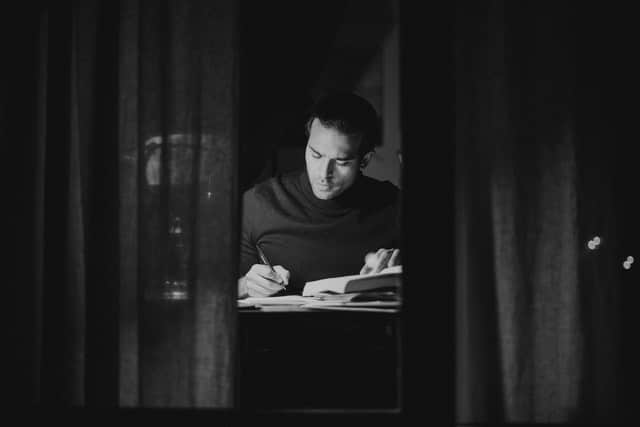
9 Reasons Why You Should Write an Autobiography
9 REASONS WHY YOU SHOULD WRITE AN AUTOBIOGRAPHY
Academy Award-winning actor Sidney Poitier once remarked, “My autobiography was simply the story of my life.”
Indeed, an autobiography is testament to a life well-lived. However, some erroneously believe that an autobiography’s subject must be a celebrity or wealthy person.
The truth is that anyone can write an autobiography. After all, there is nothing egocentric about chronicling one’s journey through life. The ups and downs that characterize lives provide sufficient reason to produce an autobiography.
In this article we will explore nine reasons why writing an autobiography in 2021 is a worthwhile endeavor.
9 Reasons Why You Should Write an Autobiography in 2021
1. It provides a legacy for future generations.

A legacy is an important part of a well-lived life. After all, a legacy is an indelible memento that lives on for generations.
As the great poet Maya Angelou put it, “If you’re going to live, leave a legacy. Make a mark on the world that can’t be erased.” Undoubtedly, a legacy can serve as an enduring fingerprint.
Indeed, future generations can recall truly remarkable lives. Nevertheless, memories tend to fade with time. Eventually, these amazing lives may get lost in the sands of time. Thus, it is crucial to chronicle such lives in a lasting format.
Consequently, the foremost reason for writing an autobiography is to set the record straight. An autobiography should serve as a personal, first-hand account about valuable life experiences. As such, the enduring legacy morphs into pearls of perpetual wisdom.
An autobiography allows these pearls to move from generation to generation. After all, words recorded on a page cannot fade away easily.
2. It helps you take your place in history.

Every person that has ever existed occupies a place in history. Sadly, the vast majority of them lose their voices over time. Memories fade and die away with each passing generation. And over time, each current generation forgets the contributions their ancestors made in shaping who they are today.
Writing an autobiography enables the author to claim their rightful place in history. Moreover, the author can tell their story in their voice. As a result, autobiographers plant flags that no one can remove. Future generations can then take these flags as the roadmap to a brighter tomorrow.
Greek statesman and general Pericles famously said, “What you leave behind is not what is engraved in stone monuments, but what is woven into the lives of others.”
Unquestionably, time decays even the largest of monuments. Nature can destroy them. However, no force can shatter the fabric of the human spirit.
Time will inexorably pass. With it, memories of great people will perish unless they claim their rightful spot in history. An autobiography is an ideal means of asserting one’s position in the scope of yesteryear.
3. You can better understand your life’s journey.

It is highly common for people to feel disconnected from their identity. After all, it can be somewhat difficult to carve an identity without understanding the journey leading up to the present.
The immortal Greek philosopher Aristotle said, “Knowing yourself is the beginning of all wisdom.” Knowing oneself leads to understanding one’s journey.
Of course, there are times in which the past is murky at best. However, clarity can come from an autobiography.
An autobiography is an exercise in self-discovery. It allows the author room to explore their journey. As a result, knowledge of oneself emerges as the journey comes into focus. The written chronicle enables the reader to glimpse into the magical path of self-discovery. Hopefully, this path will also help the reader discover their path.
It is worth noting that an autobiography should not be a bullet-point list of events and facts. Instead, an autobiography should provide a narrative that facilitates exploring the journey of self-discovery. The reader can then take this journey and use it for their benefit.
The most inspirational autobiographies give readers an opportunity to reflect on their journey. Most importantly, superb autobiographies profoundly connect with readers. Wonderful autobiographies are like mirrors in which readers can see their reflections.
4. Writing an autobiography is great therapy!

Psychologists often recommend that their patients write their thoughts and feelings. The aim is for individuals to make sense of their emotions by articulating them.
At first, these thoughts might lack clarity and direction. Nevertheless, they begin to take shape as the writing process continues.
Writing an autobiography is a process that requires the author to explore their emotions at various junctions of their life. However, the autobiographical process reviews the author’s life with the benefit of hindsight. Hence, the healing process can consequently emerge.
As a renowned writer and journalist Graham Greene put it, “Writing is a form of therapy; sometimes I wonder how all those who do not write, compose, or paint can manage to escape the madness, melancholia, the panic, and fear which is inherent in a human situation.”
Indeed, human nature is rife with a myriad of emotions, both negative and positive. Therefore, writing serves to dissipate such emotions and achieve clarity.
Often, autobiographies emerge from journaling. Personal journals are the ideal source material for great autobiographies. After all, journals allow autobiographers to go back in time to see their state of mind at the time of writing. From there, hindsight can begin to make sense of it all.
5. It helps you establish connections.

Modern technology and on-the-go lifestyles can often lead to isolation. It is quite easy to lose focus due to the multiple distractions that abound. The ensuing disconnect can lead individuals to miss their place within society.
When writing an autobiography, the author must establish a connection within their immediate social circle and society as a whole. After all, the surrounding social environment directly influences the author’s actions and reactions.
The social environment can provide valuable clues to understand the context in which the autobiographical exercise takes place.
Humanitarian and philanthropist Melinda Gates once said, “Deep human connection is… the purpose and the result of a meaningful life – and it will inspire the most amazing acts of love, generosity, and humanity.”
Undoubtedly, having a deep human connection with the world helps individuals express their humanity. Consequently, an autobiography can become a vehicle for such connections.
The writing process enables authors to see where they fit within their social context on a personal level.
More often than not, autobiographers realize they have played a far more important role than they could have ever imagined. As a result, the writing process is nothing more than a record of their noteworthy contributions.
6. It gives you a new sense of purpose.

It is not uncommon to go through life perceiving a lack of purpose. Whether conscious or not, all people go through life with a purpose driving them.
Naturally, everyone’s purpose differs. However, that purpose does not generally come into focus without careful and dedicated reflection. Hence, the autobiographical process affords those moments of reflection.
Legendary Russian author Fyodor Dostoyevsky penned, “The mystery of human existence lies not just in staying alive, but in finding something to live for.”
Indeed, everyone lives for a reason. The issue is that not everyone is fully aware of this reason.
Writing an autobiography allows the author to explore their life’s purpose. Furthermore, it allows the reader to assess theirs. In the end, the autobiographical process permits a two-way conversation in which each interlocutor can reflect on their purpose.
Please bear in mind that developing a sense of purpose is an ongoing pursuit. As such, an autobiography is akin to a collection of snapshots. Once put together, each snapshot articulates an overarching purpose.
7. You’ll make new contacts.

It may seem somewhat surprising to think how an autobiography can lead to making new contacts. A published autobiography (self-published, digital, or traditional) promotes exposure. On the surface, making new contacts may not seem like an obvious consequence, but it can certainly happen.
For some professionals, a memoir or autobiography serves to boost their visibility. As a result, their work helps create more awareness. Also, writing a book, any book, is an important milestone, especially in academic fields.
Some writers may struggle with putting pen to paper. To remedy this situation, they seek writing groups or communities. In these groups, writers find support from other like-minded individuals.
Consequently, this support allows struggling autobiographers to get through any obstacles standing in their way.
Overall, making new contacts may appear to be an indirect consequence of penning an autobiography. Ultimately, though, it may prove to be the most valuable result of all.
8. It’s an exciting process!

There are times when life seems stuck in a rut. Perhaps long-put-off projects lurk in the back of one’s mind. Or one may even be at a crossroads in life.
Whatever the case, writing an autobiography is an important box to check off one’s bucket list.
In the words of renowned actress Mia Farrow, “My father always told me I should be a writer, and I found I loved writing my autobiography; writing is such an interesting process.”
These words echo a truth regarding the autobiographical process: One does not need to be a writer to produce a quality autobiography. Writing an autobiography should not be a chore. Instead, penning one’s life story should be a labor of love.
It is the culmination of many memorable chapters while looking toward the following ones.
Indeed, writing an autobiography should bring a sense of joy and excitement into one’s life. Undoubtedly, some may find the writing process difficult at first. Nevertheless, that is where the beauty of the process lies.
The writing process is just another memorable journey in a wonderful existence. It is a process worth cherishing. Ultimately, the reader will imbibe the genuine emotions contained on every page.
9. It’ll unleash your creativity.

Producing autobiographical work is an exercise in creative writing. Thus, an autobiography should never be just a collection of facts and dates. If anything, such a work would resemble a résumé instead of an autobiography.
As novelist and essayist Chloe Thurlow put it, “An autobiography is a precious broken vase pieced painstakingly together still showing the chips and cracks.” As such, presenting a laundry list of data does little to reveal the uniqueness of that broken vase. Incorporating creative writing allows the author to fit the pieces together as neatly as possible.
In contrast, presenting a list of facts leaves many gaps in the overall picture. As a result, the reader will never fully grasp the real person behind the data. Therefore, autobiographers must unleash their creativity.
Of course, it is important to differentiate between creativity and embellishment.
Some authors use outrageous language to create an effect. While that approach is certainly valid, the main objective is to present the truth. From there, readers can build their assumptions about the true character.
In the end, an autobiography should resemble a novel. The narrative grows in the author’s voice. By the last sentence, the entire painstaking process of fitting each piece together will have become evident.
Helpful Tip: Don’t be afraid to hire a ghostwriter.

Writing an autobiography does not necessarily entail producing words. In fact, it is quite common for autobiographers to hire a ghostwriter to help produce a final volume.
In those cases, the author’s voice is still present in the narrative. The difference lies in employing the assistance of a professional writer to facilitate the process. After all, not everyone has the time, skills, or experience to produce a full-length book.
The most important consideration is to portray the subject as realistically as possible. As a result, ghostwriters should not take any creative license. The subject’s voice, personality, and character must be present at all times.
Often, ghostwriters conduct interviews to gain a clear understanding of the subject. Then, multiple revisions ensure the subject’s true character emerges on every page.
Therefore, the subject ought to be present throughout the entire process. Otherwise, the book will shift from an autobiography to a biography.
Additionally, ghostwriters may take a collection of journals or memoirs and articulate them into a single narrative. This approach would constitute an autobiography as the writing help mainly focuses on editing rather than creating.
Conclusion

Writing an autobiography may seem like a daunting task at first. However, there is no reason why anyone should hold back. After all, there are countless individuals out there with extraordinary stories to tell.
There are plenty of reasons why anyone ought to pen their story. It is just a matter of allowing the creative juices to flow freely. And, if necessary, enlisting a professional ghostwriter to aid in the writing process.
The outcome will indeed have a lasting impact on people across generations to come.
Related Content
- 2 Comments
Subscribe to Newsletter
- Elevate Your Content: How To Use Canva for Eye-Catching Visuals
- These Tools Are Your Key to the Content Campaign Kingdom
- Strategic Content Marketing: Distribution Methods for Maximum Reach
- The Abilities and Limitations of AI in Content Creation
- How to Use AI to Power Up Your Marketing Communication Strategy




2 thoughts on “9 Reasons Why You Should Write an Autobiography”
I want to read autobiographies. But first I want to understand why people write them. Providing a legacy for a future generation honestly seems worth it.
We couldn’t agree more!